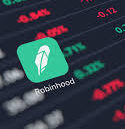Technology
Robinhood Has Received Billions From Silicon Valley Investors

Robinhood, the day-trading app that has recently been criticized for restricting the trading of certain stocks after amateur traders drove up their prices, has received billions in investments by Silicon Valley companies.
The company announced that it raised $3.4 billion in a Feb. 1 press release, with Ribbit Capital, a Palo Alto venture capital firm, leading the effort. Other Silicon Valley investors include Iconiq Capital and Index Ventures, both headquartered in San Francisco, and Sequoia Capital, which invested heavily into Apple, WhatsApp, PayPal, Zoom and other tech companies.
While Robinhood appears to be in a strong position — it has been at or near the top of the App Store for a week — the company has found itself under increased scrutiny from not only millions of amateur investors, but Congress as well.
Lawmakers of both parties have called for investigations into why Robinhood abruptly halted trading on some stocks in January, and Vlad Tenev, the company’s CEO, is expected to testify before the House Financial Services Committee on Feb. 18.
Despite the congressional attention, some of Robinhood’s investors have doubled down on the company.
“If you’d asked me a week ago if it was possible to do all this stuff in 72 hours, I’d have told you no way,” one investor told Axios regarding the company’s record downloads and fundraising total. “It’s easy to shit on [Tenev] for how he said things in a TV interview, but behind the scenes he and everyone else really delivered.”
Tenev appeared on television multiple times last week to defend Robinhood’s halt on trading stocks of like GameStop and AMC Theaters, which amateur investors had invested in en masse, skyrocketing their prices and resulting in certain hedge funds, which had shorted the stocks, losing billions of dollars. The move resulted in widespread criticism and allegations that Robinhood sided with multibillion dollar funds instead of individual American investors.
“We had to make a very difficult decision,” Tenev said on CNBC last week. “We absolutely did not do this at the direction of any market or hedge fund or anyone we route to or other market participants.”
“We’re really in unprecedented times, and in order to protect the firm and protect our customers, we had to limit buying these stocks,” Tenev said.
All content created by the Daily Caller News Foundation, an independent and nonpartisan newswire service, is available without charge to any legitimate news publisher that can provide a large audience. All republished articles must include our logo, our reporter’s byline and their DCNF affiliation. For any questions about our guidelines or partnering with us, please contact [email protected].

